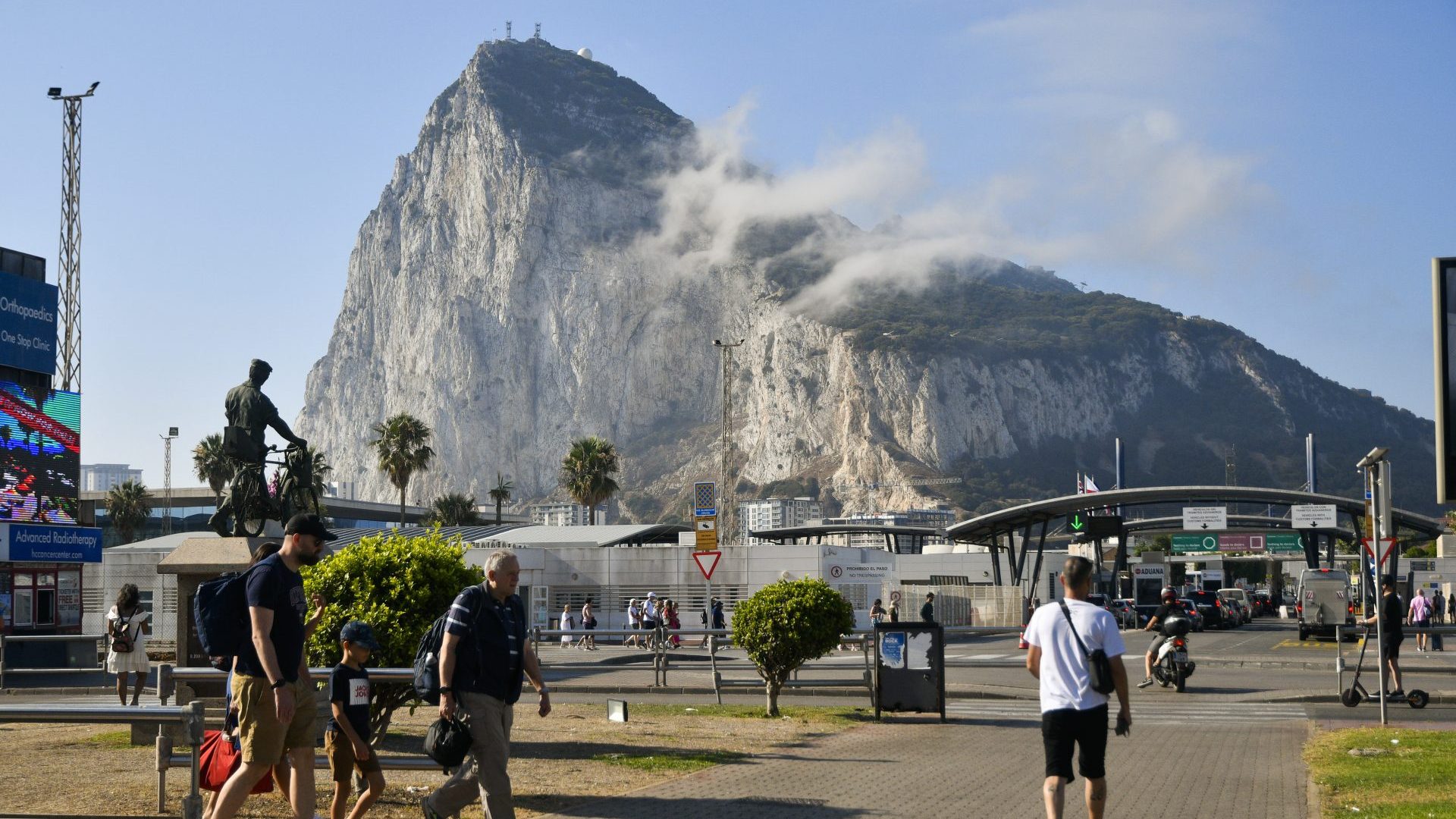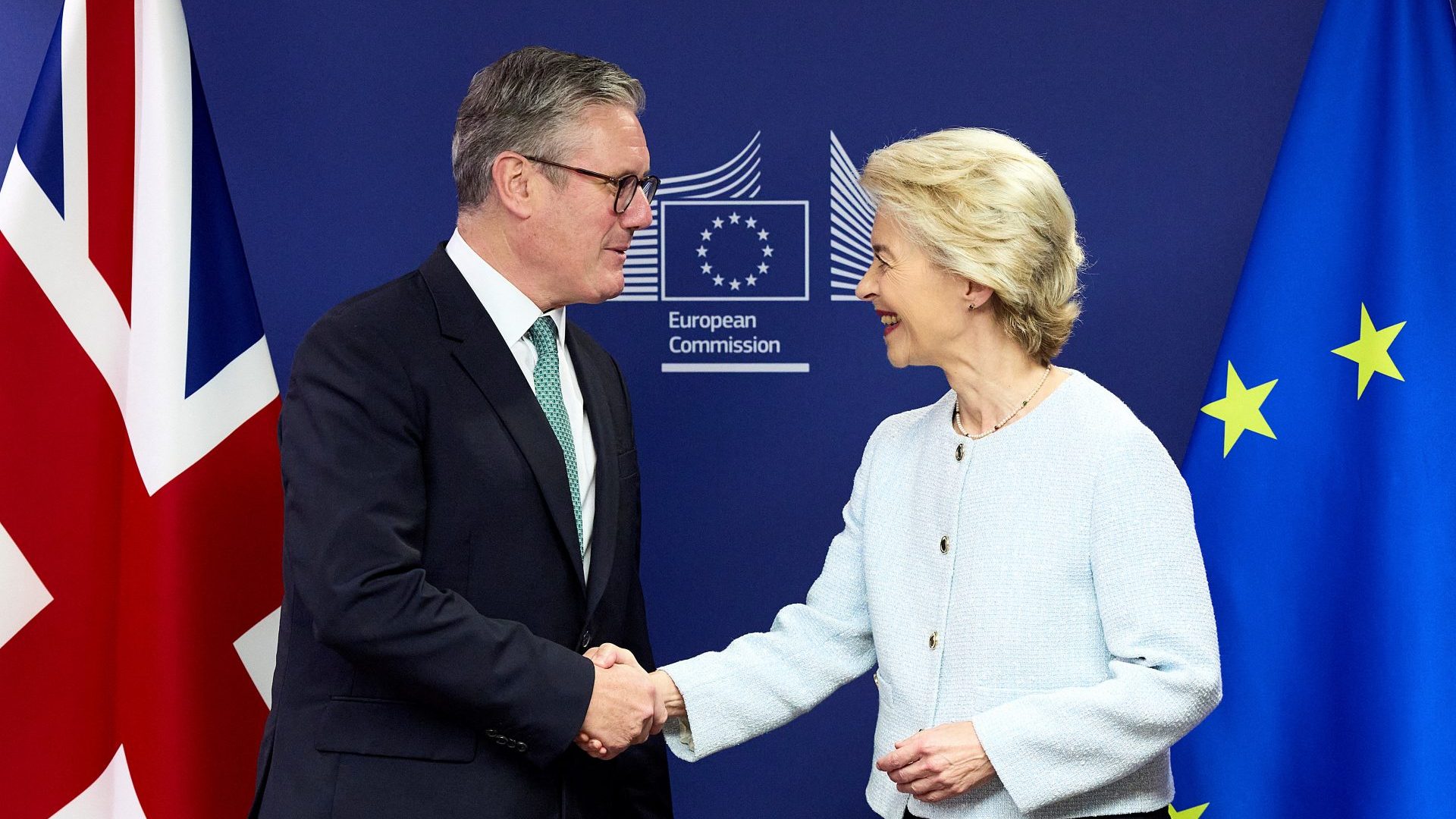As you approach Gibraltar by car from the Spanish side you see just why the UK has managed to hold on to it for the last 311 years. It is a vast, towering wall of rock, facing the mainland. To Spain it is a dagger in their back. To the UK it is a vital base and a self-governing British enclave.
But now it is also coming under intense pressure. The reason is Brexit.
The Spanish border guards barely glanced at my passport, and a moment later I was across the border and back in the UK. There were red letterboxes, fish and chip shops, an M&S and British police.
To get the fullest idea of Gib’s importance to the UK, I made my way to the very top of the Rock. From there, on a warm, sunny and clear September day, you can also see why Britain has been so keen to defend this enclave. The view is spectacular, the coast of Africa looks close enough to touch. Ships lie at anchor in the calm bay with dozens more passing through the narrow straits.
But the view also has a profound strategic consequence – for the last three centuries, nothing could get either in or out of the Mediterranean without the Royal Navy knowing all about it. Nowadays on the top of the Rock there is a radar dome, accompanied by an array of antennae. Gib is the key to the Med.
The Rock became a British outpost after it was captured during the war of Spanish Succession and then ceded to Britain in perpetuity at the Treaty of Utrecht, in 1713. That permanence has been a source of extreme irritation for Madrid, where it is often referred to as the “last colony in Europe”.
But Brexit has thrown a spanner into the works. It has undermined the future of Gibraltar, and the Spanish and the Gibraltarians know it.
Back in 2016, 96% of Gibraltarians voted to remain in the EU, delivering by far the largest pro-EU majority in the referendum. The reason isn’t hard to find. Every day, 15,000 people cross the border between Spain and Gibraltar for work, which amounts to around 13 million crossings a year.
The Spanish workers who cross the border every day make up 50% of the Rock’s entire workforce. Without them and without the open border, Gibraltar would immediately grind to a halt. Now, the threat of border checks that would imperil the Rock’s future seem closer than ever.
As one local told me, “We voted to stay in because we knew the consequences. We have not a single farm or factory here. We import everything we eat, sell or use; the only thing we have is our own electricity generation and our own water.”
Small wonder that one of the local bobbies on the beat on the high street explained with masterful British understatement: “Brexit is a bit of a gripe for everybody”.
The end of free movement here would be a disaster for Gibraltar and pretty much every single resident knows it. It is what those on the Rock have been sweating about ever since, Gibraltar was pulled kicking and screaming out of the EU.
It left with one key difference to the rest of Britain. Gibraltar was not included in the Trade and Cooperation Agreement (TCA), the deal between the EU and the UK which made Brexit a reality. It was decided that Spain and the UK could argue over the Gibraltar issue themselves.
That argument has now been dragging on for eight years. Everyone says that a solution is “inches away”, but they have been saying that for years. John Isola, president of Gibraltar’s Chamber of Commerce, told me about the stumbling blocks.
“The EU wants to protect the Single Market and the Schengen area,” he said. “They need to know that the Schengen checks are taking place.” Another priority is to avoid “distorting the Single Market by goods coming into the EU from Gibraltar”.
The real sticking point, then, is where the border with Spain should be. Gibraltar has always been treated as part of the Schengen area, which means there are external checks on visitors but no internal ones between EU member states. So, there are barely any safeguards or controls at the border between Spain and Gib, which is fine for the workers who cross the border 13 million times a year. But what about the million or so who fly into Gibraltar or who arrive by boat?
They get to enter Spain with virtually no checks either – and there’s the rub. To keep the land border seamless, Spain wants and needs Schengen border checks to be made inside Gibraltar airport.
As John Isola says, “What was agreed in 2020 was that the Schengen controls, rather than being at the border, would be conducted at the airport and the port.” He calls it a “very practical solution.”
The problem is that Spain wants those checks to be conducted by their border guards on Gibraltarian soil. That is a deal killer. The authorities in Gibraltar would prefer a hard border with the mainland, rather than Spanish boots on the ground, even though it would bring economic chaos. In short, Spaniards overseeing arrivals at Gibraltar’s airport and seaport would be too much for the fiercely British Gibraltarians.
A compromise has been suggested – the airport border controls would be staffed by the EU’s own border force, Frontex. But when he was foreign secretary, David Cameron had to admit that any such new deal could mean British tourists would probably need a European Travel Information and Authorisation System (ETIAS) visa waiver to visit the Rock.
There the talks seem to have stalled. Cameron said they were within “kissing distance” of an agreement, but then came the general election and it all went quiet. All sides refuse refusing to discuss the matter publicly, an of just how sensitive the affair is.
For Gibraltar, no deal would be a disaster. It could mean that Gibraltarians would need a visa to visit Spain and even then their visits would be limited to three months in every six months. There would be biometric checks, the border would freeze solid and all exports and imports would be given the once-over. It would be, as my taxi driver said, “a very hard border”.
Now the talks are the responsibility of a new Labour government. The Spanish foreign minister José Manuel Albares and Britain’s foreign secretary David Lammy spoke within days of Labour’s victory. The Spanish PM Pedro Sánchez and Keir Starmer have also met since the election and more talks are now planned.
It seems the deal that Cameron was negotiating is still on the table, although when the second set of talks were announced, europhobe knuckle-draggers swarmed on to social media to denounce them as treason, claiming that the new government was going to sell Gibraltar out and that there is no need for a new deal. All sensible parties agree this is nonsense.
The UK does have one significant card to play – it insists that any deal must have the agreement of the Gibraltarians. As Simon Usherwood, professor of politics and international studies at the Open University told me, the British line is that “Gibraltar has self-determination and if the population wants to change, they can.” The government is happy with that line, he said, “largely because they know that Gibraltar is almost literally to a person in favour of keeping its status with the UK.”
But that means that Lammy has an added problem. He can expect the Tory Party and its media backers to erupt, even if the deal negotiated is identical to the one that David Cameron was proposing, just as they have done over the Chagos Islands. Usherwood said: “If the Conservatives think they can make capital out of Labour selling Gibraltar short, they will obviously take that, regardless of the merits or otherwise of the deal”.
As for Gibraltar, they saw this car crash coming and voted overwhelmingly against it – but to no avail. And now they have been left in limbo, with the very people who created this mess campaigning hardest against any solution. As I put it to John Isola: “This must be why so many Gibraltarians voted Remain”. “Exactly,” he told me.
And so I returned to Spain, again with the minimum of checks and hardly any delay at the border. That border has worked well for decades with the minimum of fuss. Now it has been put in peril by us leaving the EU.
Gibraltar is not just a Mediterranean version of Britain in miniature. It is Brexit in miniature too.




